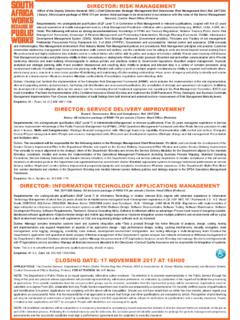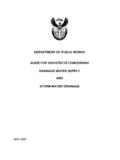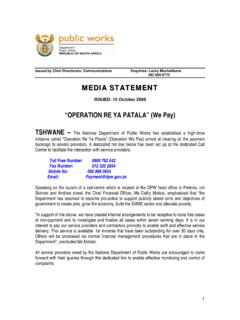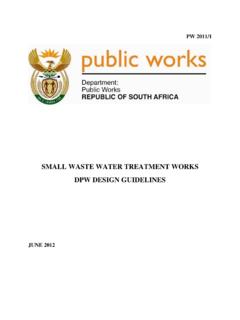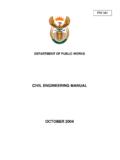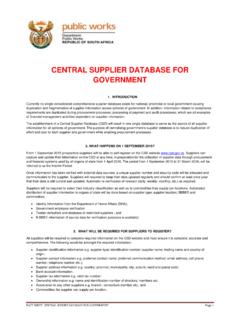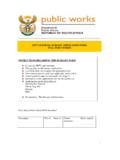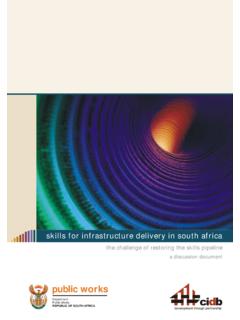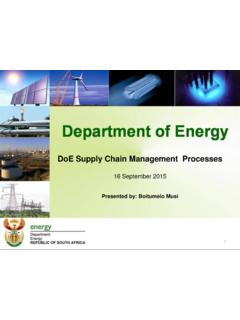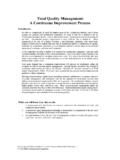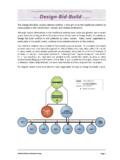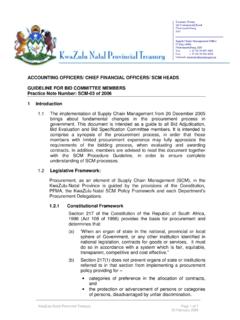Transcription of SUPPLY CHAIN MANAGEMENT POLICY - Minister …
1 SUPPLY CHAIN MANAGEMENT POLICY .. MANYE MOROKA ACCOUNTING OFFICER/DIRECTOR-GENERAL DEPARTMENT OF PUBLIC WORKS DATE: Table of Contents DEFINITIONS AND ABBREVIATIONS .. 1 BACKGROUND .. 3 INTRODUCTION .. 3 POLICY OBJECTIVES .. 6 PRIMARY OBJECTIVES .. 6 EMPOWERMENT INITIATIVES .. 8 INTERIM MEASURES FOR AWARDING PREFERENCE POINTS (ALL ACQUISITIONS) .. 8 PREFERENCE POINTS FOR QUOTATIONS (ALL ACQUISITIONS) .. 8 EMPOWERMENT IN CONSTRUCTION RELATED ACQUISITIONS .. 9 EMPOWERMENT IN PROPERTY RELATED ACQUISITIONS .. 10 FUTURE IMPLEMENTATION OF BROAD BASED BLACK ECONOMIC EMPOWERMENT .. 11 DEMAND MANAGEMENT .. 11 PURPOSE OF DEMAND MANAGEMENT .. 11 NEEDS ASSESSMENT .. 12 SPECIFICATIONS .. 12 BID SPECIFICATION COMMITTEES .. 13 SUPPLIER INDUSTRY ANALYSES .. 13 SUPPLIER MANAGEMENT AND REGISTER .. 14 PURPOSE OF THE SUPPLIER REGISTER .. 14 SUPPLIER POLICY PRINCIPLES.
2 14 ACQUISITION MANAGEMENT .. 16 PURPOSE OF ACQUISITION MANAGEMENT .. 16 A UNIFORM ACQUISITION POLICY .. 16 STANDARD ACQUISITION PROCEDURES AND EVALUATION METHODS .. 17 SCORING OF BIDS AND VALUE FOR MONEY (EXCLUDING CONSTRUCTION BIDS) .. 17 DISCONTINUING QUALITY OR FUNCTIONAL SCORING ON CONSTRUCTION BIDS .. 17 BID EVALUATION AND ADJUDICATION COMMITTEES .. 18 DELEGATIONS .. 18 LOGISTICS MANAGEMENT .. 19 PURPOSE OF LOGISTICS MANAGEMENT .. 19 A UNIFORM LOGISTICS POLICY .. 19 DELEGATION AND ACCOUNTABILITY .. 20 CONTROL OVER REGULAR EXPENDITURE ITEMS .. 20 MOVABLE ASSET MANAGEMENT .. 21 PURPOSE OF MOVABLE ASSET MANAGEMENT .. 21 LIFE CYCLE PLANNING AND FULL LIFE-CYCLE COSTS PRINCIPLE .. 21 CONTROL OVER MOVABLE ASSETS .. 22 DISPOSAL MANAGEMENT .. 23 RISK MANAGEMENT .. 25 PERFORMANCE MANAGEMENT .. 26 IMPLEMENTATION OF THIS POLICY .. 27 SCM POLICY Page1 Vers 5 Definitions and Abbreviations Bid means a written offer in a prescribed or stipulated form in response to an invitation by the Department for the provision of goods, services or works with a value threshold above R500 Bid Adjudication Committee / Bid Committee means the committee at head office or in the Regional Offices, that adjudicates over bids issued by the Department, adjudicate over the sourcing strategy and award bids as per the recommendation of the Bid Evaluation Committee or reject the recommendations, where the value of the bid is above R500 Bid documentation means the standard documentation utilised by the Department when soliciting a bid or quote.
3 Bid evaluation committee means the committee appointed to evaluate bids. Bid specification committee means the committee that is appointed to develop the sourcing strategy and approve the bid specifications or terms of reference. Bidder means a vendor that submits a bid for contracts with a value threshold above R500 Black people is a generic term which means Africans, Coloureds and Indians as per the BBBEE Act Broad-based black economic empowerment (BBBEE) means the economic empowerment of all black people including women, workers, youth, people with disabilities and people living in rural areas through diverse but integrated socio-economic strategies that include, but are not limited to: a. increasing the number of black people that manage, own and control enterprises and productive assets; b. facilitating ownership and MANAGEMENT of enterprises and productive assets by communities, workers, cooperatives and other collective enterprises; c.
4 Human resource and skills development; achieving equitable representation in all occupational categories and levels in the workforce; d. preferential procurement; and e. investment in enterprises that are owned or managed by black people. CIDB means the Construction Industry Development Board. Contractors means a contractor as per the CIDB Act. Custodian Asset MANAGEMENT Plan means a Custodian Asset MANAGEMENT Plan as defined by the Government-wide Immovable Asset MANAGEMENT Act. Functionality criteria means the suppliers ability to meet the service delivery requirements. Generic scorecard or any relevant charter means the scorecard that is promulgated in terms of the BBBEE Act. Government means the government of the Republic of South Africa. "Historically Disadvantaged Individual" (HDI) means a South African citizen, who: a.
5 Due to the apartheid POLICY that had been in place, had no franchise in national elections prior to the introduction of the Constitution of the Republic of South Africa, 1983, (Act No. 110 of 1983) or the Constitution of the Republic of South Africa, 1993 (Act No. 200 of 1993: "the Interim Constitution), and / or b. Is a female, and / or c. Has a disability; provided that a person who obtained South African citizenship on or after the coming to effect of the Interim Constitution is deemed not to be an HDI. Immovable asset means an immovable asset as defined by the Government-wide Immovable Asset MANAGEMENT Act. Movable Asset register means the register in which all the movable assets of the Department are recorded. National Bid Adjudication Committee (NBAC) means the Bid Committee that sits at Head office. SCM POLICY Page2 Vers 5 Official means an employee of the Department.
6 PFMA means the Public Finance MANAGEMENT Act, 1 of 1999. Potentially emerging contractor means a contractor that is registered as a potentially emerging contractor in terms of the Emerging Contractor Development Programme of the government (ECDP). Preference points means points allocated to preference in terms of the Preferential Procurement POLICY Framework Act 5 of 2000. Quote means a written offer in a prescribed or stipulated form in response to an invitation by the Department for the provision of goods, services or works with a value threshold below R500 RDP goals means the socio-economic goals of the government of the Republic of South Africa. Regional Bid Adjudication Committee (RBAC): means the Bid Committee that sits at the Regional Office. Relevant Bid Adjudication Committee means the National Bid Adjudication Committee or the Regional Bid Adjudication Committee as the case may be.
7 Responsiveness (eligibility) criteria means the criteria or requirements that are stipulated in the bid documents which the suppliers must achieve in order to qualify to be evaluated. Supplier / Service provider means a vendor that provides goods or services to the Department. Supplier register means a register of all suppliers or service providers that intend doing business with the Department. SUPPLY CHAIN MANAGEMENT Regulations means the regulations in terms of Regulation 16A of the regulations to the PFMA. Term contractor means a supplier that has been awarded a contract with the Department to SUPPLY specified goods or perform specified services or works for a specified period. The Department / DPW means The National Department of Public Works and its regional offices. The State means the government of the Republic of South Africa and any of its Departments or institutions.
8 Vendor means an enterprise that provides a bid or quote with the intention of entering into a contract with the Department to SUPPLY the Department with goods, services or works. SCM POLICY Page3 Vers 5 Background 1. Since the inception of the procurement reform process in 1995 the Department of Public Works (the Department) has been actively involved in conceptualising and implementing procurement reform. The White Paper on Public Works beyond 2000 called for a Ten Point Plan to advance individuals and businesses that were disenfranchised before 1994. This was the Department s first attempt to implement procurement reform and advance previously disadvantaged individuals. 2. In 1996, Targeted Procurement (TP) was developed by a Procurement Task Team and adopted by the Department as a means of implementing procurement reform. TP was primarily aimed at construction enterprises and excluded other procurement environments.
9 Unfortunately, this approach fragmented the Department s procurement policies between TP, and the policies adopted to support the appointment of consultants and provisioning administration. 3. In September 2003 Cabinet adopted the SUPPLY CHAIN MANAGEMENT (SCM) POLICY to replace outdated procurement practices. The SCM framework is characterised by a number of key differences from procurement including: a. moving away from central control by National Treasury and the State Tender Board towards increased responsibility and accountability by the accounting officer of each department; b. introducing a preference point system to address socio-economic issues, value for money and the scoring of bids thereby facilitating the move away from relying solely on the traditional practice of only accepting the lowest price bid; c.
10 Linking procurement practices to the planning and budgetary process through the introduction of demand MANAGEMENT practices; d. assessing the value of assets based on its contribution to service delivery and return of public funds invested; e. introducing uniformity in bid documentation to reduce the uncertainty amongst bidders; and f. improving the uniformity in government s preferential procurement policies and processes. 4. The most significant change brought about by the SCM regulations (16 A) was abolishing the National State Tender Board and the implementation of bid adjudication committees accountable to the accounting officer. 5. THIS POLICY WILL BE IMPLEMENTED WITH EFFECT FROM 01 MAY 2008. Introduction 6. The SCM Regulations are intended to modernise public sector procurement, provisioning and related functions. The implementation of an integrated SCM system will contribute significantly towards the improvement of financial MANAGEMENT in the public sector.
